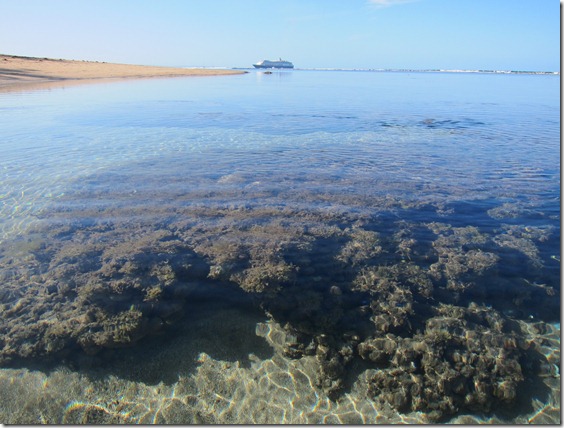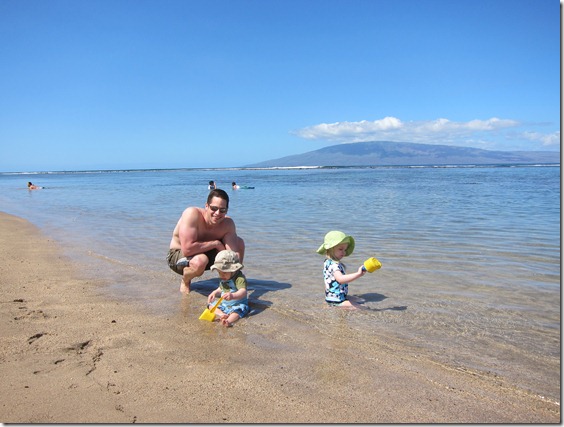Downtime with Nature: What You Need to Reduce Stress, Increase Attention, and "Create Again"
with 5 comments
I’m writing this overlooking the Pacific Ocean with an iced coffee by my side, and a gentle breeze on my face. I’ve spent the last week in Maui with my family, so please excuse the obligatory photos of paradise!
While on the island, I’ve been doing everything I can to unwind. I’ve been devouring scones, French fries, margaritas, Oreos, bacon, Frosted Mini Wheats and other junk I don’t allow myself to even consider eating most of the time. I’ve stopped tracking my habits. I’ve exercised just once if you don’t count swimming and chasing my kids; a short run near the beach on our first day here. I haven’t spent any time checking tasks off of my lists; in fact I had moved them all over to a "Post Vacation" category before we left the mainland so I wouldn’t even stumble upon them accidentally. I haven’t done much writing, stretching, or flossing, and I’ve had a metric ton of Maui Coffee. It’s been great!
Yet I’m not too concerned about slacking off, or at least not as much as my Type A personality would suggest. Though I’m itching to get back into my routine, I’m not worried about what would normally be viewed as a setback.
Planned breaks like these are required to reset my passion meter from time to time. I try and force myself to "unplug" from my (somewhat) normal intensity to help me remember why I do what I do to begin with. It’s hard to hit the ‘off’ switch… it’s frankly just as hard as turning it back on again, but I try and view it as sort of like stopping at a gas station before a long road trip; breaks like this fuel me for at least a few months, and after six days of gluttony and objective laziness, I always realize that it’s not the permanent life for me.
But what you do for a few weeks out of the year doesn’t define the year, and it doesn’t define you. It’s what you do most of the time, not just some of the time, that makes the difference over the long haul. Have consistency in the fundamentals (modulo a week here and there) and personal growth is inevitable.
Times like these I also do more reading than normal. Between Audible and Kindle books, or just stopping to think while walking the beach, my mind is still completely active. Thinking and reading lead to ideas, which lead to goals and objectives, which lead to plans, which eventually may lead to new ways to experience flow. Even when I’m not doing anything of substance, I still feel like I’m creating. I jot down more thoughts and learn more new things while on vacation than at any other time throughout the year. It’s part of what I look forward to about these breaks. It’s not a surprise that while on vacation I’m also closest to nature (more on that in a minute).
Recreation, or "creating and bringing forth again", is an essential part of leading a full life. It’s no surprise then that recreation means ‘creating again’. Without time to reflect, unwind, and just plain BE, it’s hard to maintain any sort of pace in your normal life. Creativity is sapped if you’re not detaching every once in a while. Whether it’s fifteen minute micro-vacations or weeklong actual ones, human beings can only thrive when they have regular periods of downtime.
As discussed in the past, focusing attention is a lot like exercise (what isn’t?) – after enough directed attention, you just can’t focus any longer. You’re sapped. Your willpower and focusing abilities weaken to the point of being utterly ineffective. This state as it relates to attention even has a name, it’s called Directed Attentional Fatigue (DAF) and it’s described as a "temporary fatigue of the inhibitory mechanisms in the brain.” The symptoms of DAF include feelings of distraction and even forgetfulness, leading to poor judgment and an increase in stress levels, high blood pressure, and irritability. It’s what happens when you wait too long to relax. Hit this state too often and you’ll eventually burn out.
Taking time out to regain perspective and recharge your batteries is critical. Fifteen minutes here and there make a huge difference, and of course longer periods of time help as well.
While it’s important to take this time when you can, you’ll also benefit greatly by feeding your innate biophilia, or ‘attraction to living systems and natural settings’. When you picture your perfect place to be, all other things being equal, chances are you are NOT picturing a packed New York City subway car. It’s probably some place deep in nature surrounded by water, trees, a breeze, and the scent of nature uninterrupted. We’re hard-wired to be one with nature. Returning to it can make a difference.
Nature’s ability to restore is backed by science as well. Marc Berman and his colleagues at the University of Michigan have found that even short periods of exposure to a metropolitan street can affect one’s ability to focus, but spending time in a natural environment – or even just looking at pictures of a natural environment – can help restore attention (a 20% improvement!). I guess it’s not surprising that so many people have the ocean and trees as their PC desktop backgrounds.
The Japanese have a term for this focus on nature as restorative. It’s Shinrin-yoku, or forest bathing. A short, leisurely visit to a forest to help improve or restore attentional powers. Related to the benefits of natural aromatherapy, forest bathing has also been shown to boost immunity, lower blood pressure and resting heart rate, and help reduce stress due to "phytoncides, the airborne chemicals that plants emit to protect them from rotting and insects". Being around nature even increases neuroplasticity, or the brain’s ability to form new connections (strangely enough – or maybe not – that’s another post I wrote while in Hawaii!)
Attention Restoration Theory, developed by Rachel and Stephen Kaplan also of the University of Michigan, asserts that concentration improves with exposure to nature as well. Shifting into a state of "soft fascination" as the Kaplans call it, seems to help the most to restore focus and attention. Soft fascination – cloud gazing or just strolling on the beach or in the woods – is in stark contrast to “hard fascination” where your attention is overwhelmed by stimuli. Yet people tend to turn to things that require directed attention in order to “relax”, like sporting events or television, without realizing that they’re not restorative. Getting out into nature, however short the time may be, is a great way to return to your normal, focused self.
This doesn’t really feel like something we should need science to tell us, but like so many things, proof serves as a reminder. Recreation and time spent in nature don’t require long trips to tropical locations of course, just short daily walks outside in a natural environment close to home or work can help restore energy and vitality. Give it a try for yourself!
Back to the beach…
Note: One of the things I’ve realized while overloading on white carbs and drinking a bunch of empty calories is that I want this blog to be a little more… well, personal. Looking back over the last two years (by the way, happy 2nd birthday to Refocuser!) the entries I’m most proud of are the ones that relate concepts back to my personal reality. The entries I’m least proud of feel like my old Psychology textbooks; impersonal, bland, and preachy. So I’ll be working on this more as Refocuser enters Year Three.





